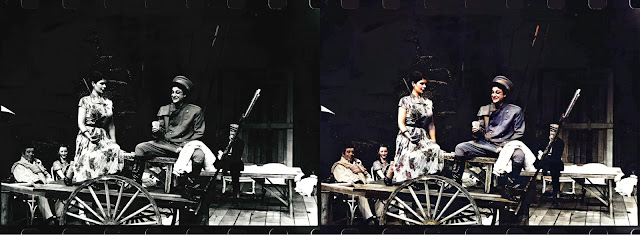This March, we're presenting Denise Mina's gender-switched adaptation of Brecht's joyous comedy Mr Puntila and His Man Matti. Here, our Heritage Archive and Exhibitions Officer Laura Stevens looks back at Brecht's original and its history with the Citz.
 |
| Celia Imrie (Eva) with Jane Bertish (Matti). Photographer: John Vere Brown |
Brecht came of age in Weimar Berlin (1919-1933) where he gained a great deal of inspiration for his future works. His passion for sharing Socialist ideals through his writing meant he was a prime target for the growing Nazi movement. Not long after Hitler gained control of the German parliament in 1933, Brecht fled Germany with his family. They initially made their way to Denmark before eventually arriving in Finland, where they applied for passage to America (which was granted in 1941). It was during his time in Finland that Brecht wrote
Mr Puntila and His Man Matti. He based the story on a play written by his friend Hella Wulijoki, with whom he was staying at the time.
 |
| Ref: STA Ex24_11c. Courtesy of Scottish Theatre Archive |
Mr Puntila and His Man Matti is not one of Brecht's best known plays, and there has only been one previous production at the Citizens Theatre.
Puntila and Matti: Master and Servant was staged in 1982. The cast features many strong Citz names: Patrick Hanaway, Celia Imrie, Ida Schuster and Derek Watson. A notable twist on the cast is that Matti was played by a woman, Jane Bertish. Reviews indicate that the role of Matti remained very much a male character that was being played by a female actress.
“Jane Bertish…she had a very difficult part to play but she did bring out a lot of the comedy.” Prospect.
 |
| Citizens Theatre Company Archive. Courtesy of Prospect. |
 |
| Citizens Theatre Company Archive |
Puntila and Matti marked the beginning of the Citizens’ Spring Season (1982). It was one of the first shows where free tickets could be claimed by the unemployed, on the production of a UB40. There’s a sense of irony that a play extolling the negatives of capitalism was used to launch such a scheme. This was not unnoticed by reviewers, as was their pleasant surprise at seeing this production of a little-known Brechtian comedy.
 |
| Puntila and His Man Matti Playbill 1982 |
 |
| Citizens Theatre Company Newscuttings Reviews 1981-1982. Courtesy of The Guardian. |
 |
| Citizens Theatre Company Newscuttings Reviews 1981-1982. Courtesy of The Sunday Mail. |
Much praise was lavished on Jane Bertish for her comic portrayal of Matti, with strong support from Celia Imrie (Eva) and Laurance Rudic, as the diplomat she is engaged to.
 |
| Celia Imrie (Eva). Photographer: John Vere Brown. |
Part of Brecht's inspiration behind writing Puntila was to help distract himself, through the medium of comedy, from the fascism taking over Germany and the resulting war spreading across Europe. This context influenced the creative direction of the 1982 production, with cast playing Brecht and his family entering via the back of the auditorium, carrying bags on their backs and accompanied by the sound effects of gun fire. Terry Bartlett’s highly praised set comprised of a large scale barn, complete with hay stacks, to contrast from the battle scared landscape that Brecht had escaped from.
 |
| Jane Bertish (Matti) and Patrick Hannaway |
In
Mr Puntila and His Man Matti, Brecht used comedy as a tool to reveal the injustices of capitalism and the dangers of the far right. Denise Mina's new version also uses humour to expose uncomfortable social issues that still exist in society today.
Denise Mina's reworking of Brecht's comedy opens at Tramway 25 March.
Book your tickets here.
Mrs Puntila and Her Man Matti is co-production with Royal Lyceum Theatre Edinburgh in association with DOT Theatre, Istanbul.










Comments